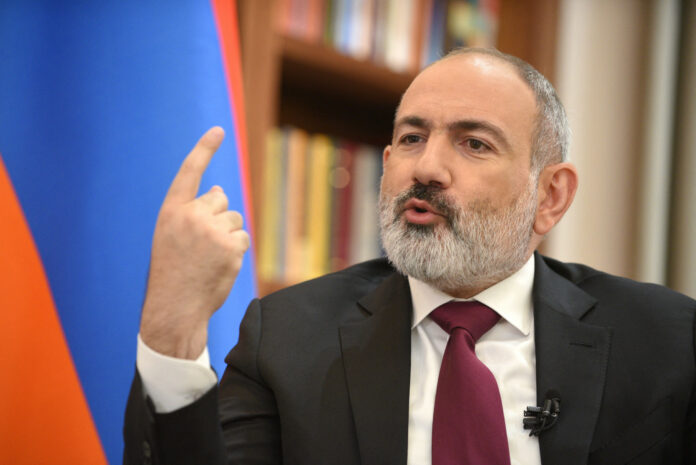Heart-wrenching scenes recently greeted Russian peacekeepers at their base in Nagorno-Karabakh as tens of thousands of ethnic Armenian civilians sought safety.
This tragedy was the conclusion to Azerbaijan’s long campaign to ethnically cleanse the region of its Armenian population, and it’s been completed while the international community watches on in near silence.
After a day marked by intense shelling and rapid territorial gains, Armenian de-facto authorities in Nagorno-Karabakh, also known as Artsakh, reached a Russian-brokered ceasefire agreement with Azeri forces.
Even though a massive explosion at a fuel depot recently killed even more Armenians, the ceasefire still holds. But the fate of the 120,000 Armenians of Nagorno-Karabakh remains in question. Will it be safe to stay, or should they flee?
What isn’t up for debate, however, is that Armenia’s choice of military ally has been a tragic misstep.
As a member of the Russian-led Collective Security Treaty Organization (CSTO) military alliance, Russia should have come to Armenia’s aid during the Second Nagorno-Karabakh war in 2020, but they did not. And it wasn’t the first time. When deadly clashes broke out last year, Russia and the rest of the CSTO members were nowhere to be seen.
Distracted by its disastrous invasion of Ukraine, Russia’s clout in the region has collapsed. And now Armenia must look for stronger security guarantors.
In recent weeks, Armenia sent its first aid package to Ukraine and conducted its first military exercise with the United States. The Armenian government even recalled its permanent representative to the CSTO and sent the Rome Statute—the founding treaty of the International Criminal Court that issued an arrest warrant for Russian President Vladimir Putin—to the parliament for ratification.
Aware that Western nations have been equally unable to stop Azeri aggression, Armenia has also reached out to Iran, proving this conflict could escalate into a vicious proxy battleground involving multiple influential regional powers.
KAREN MINASYAN/AFP via Getty Images
After all, no matter the fate of Nagorno-Karabakh, the Armenian government will still need stronger allies who will guarantee its security and placate a justifiably angry population tired of defeat.
Despite Azerbaijan appearing to succeed with this latest offensive, there are no guarantees it will stop there. Since the last war in 2020, talks of taking the Armenian province of Syunik and creating the so-called Zangezur corridor between Azerbaijan and its exclave of Nakhchivan have only increased.
Due to Azerbaijan’s strong military connections with Israel, and the potential for Israel to use Azeri territory for operations against Iran’s military sites, it’s in Iran’s benefit to actively curb Azeri influence in the Caucasus region.
Iranian discourse concerning Azeri expansion has been progressively escalating prior to this recent offensive. In early September, Iran issued a warning declaring any alterations to the Armenia-Azerbaijan borders would be a “red line.”
Considering Iran’s harmful engagement in numerous global conflicts, Western powers must not be complacent toward Iran’s combative rhetoric, especially as these same Western powers face growing scrutiny on the global stage.
Last week, Ukrainian President Volodymyr Zelensky rebuked the U.N. during the General Assembly for its inability to prevent Russia’s brutal invasion of Ukraine. Shortly afterwards, Ukraine’s ally, Poland, announced a suspension of weapon shipments due to a dispute over grain exports.
In the Caucasus, everything rests on how Western institutions handle the fallout of this latest Azeri onslaught and if they can offer an alternative to Russia’s diluted influence.
The U.S. and its allies must ensure that Azerbaijan’s ambitions over Armenia permanently end. This means negotiating a permanent peace deal which also binds the Azeri regime to guaranteeing the rights, safety, and freedom of ethnic Armenians, before it’s too late.
To ensure there is not a repeat of the war crimes against civilians seen in 2020, and a few days ago, Azerbaijan must also agree to a deployment of international human rights observers—a request which was already made by Armenia at an emergency U.N. Security Council meeting.
Absolutely critical will be whether Western leaders can influence Turkey and Israel, both strong backers of Azerbaijan, to support a lasting commitment to peace. If they can’t, then Western governments must seriously consider slapping sanctions on Azerbaijan’s oil and gas exports.
Simultaneously, economic support must be offered to Armenia to enable her to build a more resilient economy that can wean itself off from Russian remittances.
Inspiration can even come from the recent deal signed between the U.S. and Vietnam, which will use economic and soft power to undermine China’s influence in the region. A similar deal, even on a smaller scale, could rival any support from Iran and build a prosperous Armenian economy no longer chained to Russia’s collapsing financial system.
Ultimately, if the U.S. fails to fill the security vacuum in the Caucasus, they won’t just weaken their grip on the region, they will also open the door to more tragedy.
George Meneshian is a Greek Armenian international relations and security expert specializing in the Middle East and the Caucasus. As a former solider he holds a unique insight into security and defense affairs and has co-authored several books on international relations and diplomacy. He currently works as a researcher at the Washington Institute for Defence and Security and head of the Middle East Research Group of the Institute of International Relations.
The views expressed in this article are the writer’s own.


